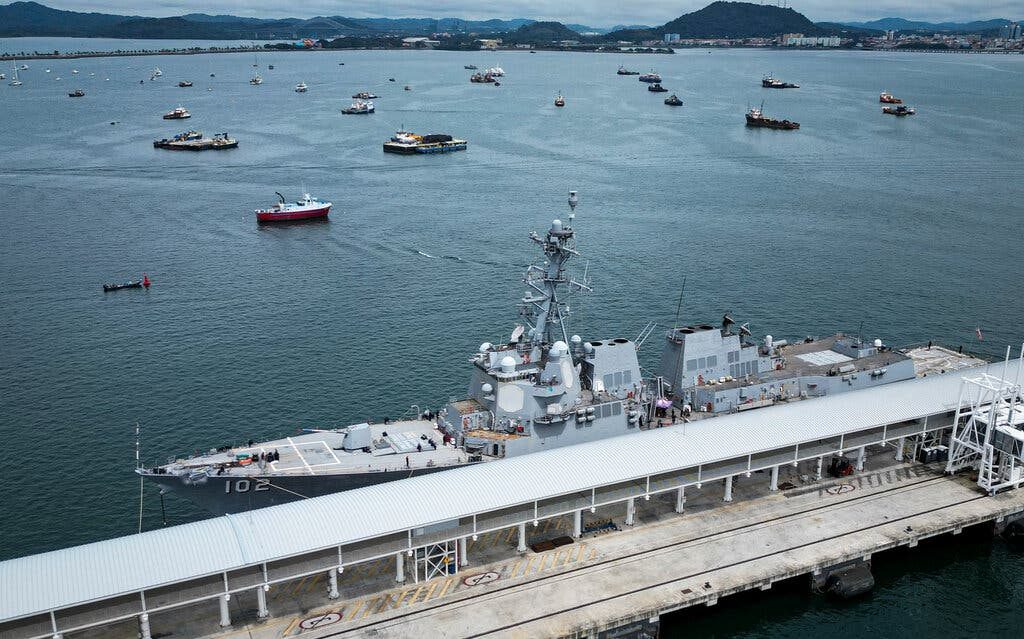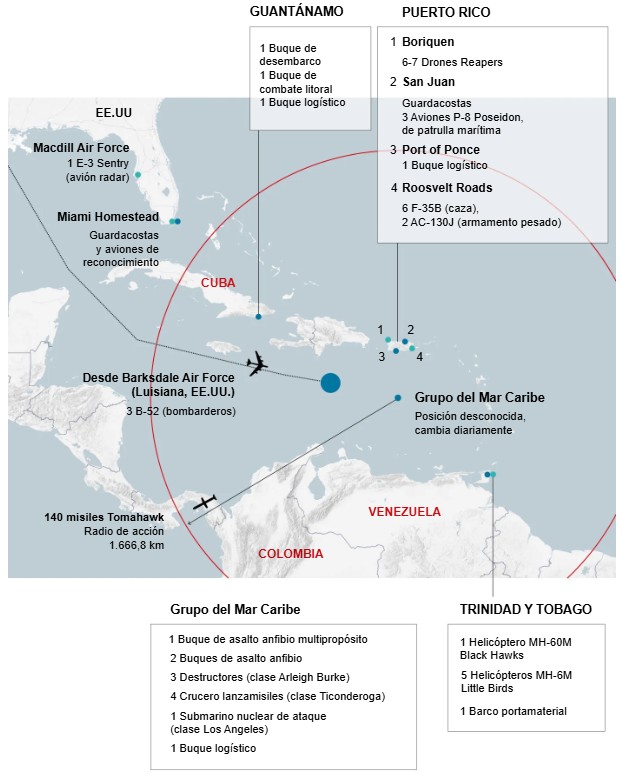
With the current deployment in the Caribbean, and with the reinforcements sent in recent days, the United States has the capacity to attack targets anywhere in Venezuela. It can launch long-range missiles from ships and submarines, carry out rapid raids with special forces transported in convertiplanes, and strike command centers from the air. It can also block ports and sea routes to cut off any escape route.
abc.es
In addition, the Pentagon maintains constant surveillance from the sea and the air. Patrol aircraft and observation systems monitor the coast, military movements, and communications, with particular attention to the border with Colombia.
According to the current tally by the Trump administration and several allies in Congress, there are now more than 10,000 troops in the region. Strategic bombers are operating from bases in Louisiana and Puerto Rico, state-of-the-art fighter jets are on escort missions, missile-armed ships are in position, and special operations units are deployed between Puerto Rico and Trinidad and Tobago.
Added to this is the Iwo Jima Amphibious Group, with more than 1,600 Marines and the ability to act immediately from sea or air. This is a very rapid and large-scale deployment of capabilities, designed to allow for a direct strike if the White House gives the order.
Although the mission was initially presented as an anti-drug operation, Washington has already made it clear that the political objective is to oust Nicolás Maduro and his elite from power. This newspaper has asked Trump twice about what concessions Maduro might make, and the answer is nothing. According to the US president himself on Friday, he should have just not messed with the United States of America. The signal: it's too late.

The strategy involves offering a release in custody or, failing that, the use of targeted force to capture or eliminate key Chavista leaders. The White House maintains that President Trump is willing to use all elements of American power, and the State Department classifies Maduro as a fugitive from American justice.
Many opponents describe it as a shift toward regime change. This operation is supported by the growing influence of Marco Rubio, Secretary of State, and Susie Wiles, Chief of Staff, while the faction that championed dialogue with Maduro, led by special envoy Ric Grenell, has been completely sidelined.
Opposition sources claim that Caracas has even offered, through intermediaries, a transfer of power to Vice President Delcy Rodríguez as a way to relieve the pressure. Trump told ABC that Maduro has offered everything to avoid a direct confrontation with the United States, but it is not enough. The mediations have also been terminated.
B-52 bombers
Trump has also intensified his military presence off Venezuela. In recent days, three B-52 bombers have flown some 150 miles off the Venezuelan coast, a show of force unlike any other. Since September, at least seven attacks have been carried out against vessels suspected of transporting drugs, and the White House has confirmed that there is prior authorization for covert CIA operations in the country, although the exact date is unclear.
What's important and revealing is that Trump isn't presenting this as an operation against a political regime, but rather as a national security action against criminal networks operating across Colombia, Venezuela, and Mexico. The White House wants to frame the fight against transnational criminal organizations, not a change of government. Washington accuses Maduro of collaborating with these groups and of maintaining an illegitimate hold on power, financed through drug sales.
The regime has responded with military maneuvers and by strengthening internal security protocols. Senior commanders move between Caracas, Valencia, and Maracay, and the armed forces have intensified surveillance in response to suspicions of disloyalty, with an eye toward possible purges.
In Washington, the Venezuelan army is considered to lack the real capacity to sustain an external conflict with the United States, although Chavismo maintains a large parallel militia, estimated at around one million members. Maduro has warned against a scenario similar to Iraq, a protracted war followed by a rapid decapitation.

